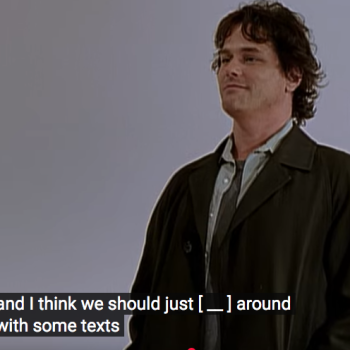The Wikipedia entry on Ursula Le Guin's provocative short story "The Ones Who Walk Away From Omelas" includes a comment from the author on where she got the inspiration for writing it: "from forgetting Dostoevsky and reading road signs backwards."
Somewhere I read a variation on this comment in which Le Guin was
quoted as saying "from misremembering Dostoevsky …" Or perhaps I just
misremembered that. In any case, with the current trend of plundering Jane Austen proving
so fruitful, I think misremembering Dostoevsky could also prove
productive.
Let's try one: What if the old pawnbroker, startled by Raskolnikov's sudden
appearance in her apartment, begins to choke on a tea cake? Forgetting
himself, Raskolnikov drops the ax and performs the Heimlich maneuver,
saving the old woman's life and beginning an awkward friendship. …
Hmm. Probably not a novel so much as a Woody Allen film. I see Mark
Ruffalo as Raskolnikov, Dianne Wiest as the old lady and, oh, let's say
Chaz Palmintieri as the detective Petrovich (although come to think of it Petrovich might not have much to do in this version of the story).
Anyway, please do follow the link and read the whole short story if you haven't already done so. Or buy Le Guin's book — The Wind's Twelve Quarters. (I'm in the newspaper business, so I'm big on encouraging others to pay for stuff they could just as easily read for free online.)
I say this not just because several commenters in the previous thread posted without reading the story, railing against the "straw-men" they were certain it contained without bothering to see that it didn't. But I also recommend this because it's a really good story. It's quite short and never dull and it's a lovely piece of writing despite the barb it has in store for everyone who picks it up.
Above all, it's a story — a parable, perhaps, but not the sort of didactic little fable that can be tidily summarized with and replaced by an aphoristic moral. (People are always trying to do that with parables and stories, poems and plays. But it can't really be done. If that summarizing aphorism were all the writer had meant, well then the writer would have written only that and saved everyone involved a great deal of time and effort. The only way to summarize a story or a poem accurately is to retell it in full.)
The bit from Fyodor Dostoevsky that Le Guin acknowledges half-forgetting is from The Brothers Karamazov, a passage in which Ivan is wrestling with theodicy:
Tell me yourself, I challenge your answer. Imagine that you are creating a fabric of human destiny with the object of making men happy in the end, giving them peace and rest at last, but that it was essential and inevitable to torture to death only one tiny creature — that baby beating its breast with its fist, for instance — and to found that edifice on its unavenged tears, would you consent to be the architect on those conditions? Tell me, and tell the truth.
Le Guin says she read Brothers K as a young woman, but that she'd never been able to bring herself to return to it (no wonder, considering the English translations then in print), and thus credits the germ of the idea more to William James. In The Moral Philosopher and the Moral Life James wrote:
Or if the hypothesis were offered us of a world in which Messrs. Fourier's and Bellamy's and Morris's utopias should all be outdone, and millions kept permanently happy on the one simple condition that a certain lost soul on the far-off edge of things should lead a life of lonely torture, what except a specifical and independent sort of emotion can it be which would make us immediately feel, even though an impulse arose within us to clutch at the happiness so offered, how hideous a thing would be its enjoyment when deliberately accepted as the fruit of such a bargain?
Le Guin refers to the idea there in Dostoevsky and James as a "psychomyth" of "the scapegoat."
And that, I think, is wrong. I don't think that quite fits. The utopias described by Ivan Karamazov and William James and Ursula Le Guin are all based on an infernal bargain, but they all take as a given that this bargain is effective.
And that separates them from scapegoats. Because the most notable distinguishing feature of scapegoats is that they do not work. Scapegoating is always ineffective.
Well, scapegoating is effective as a rhetorical device for demagogues firing up the fearful and the foolish. But what I mean is that the punishment or persecution or sacrifice of the scapegoat never produces the promised results.
As the Black Death swept across Europe, swiftly killing a third or more of the population, the people were bewildered and desperate. They had no understanding of the transmission of disease, no sense of how the plague was carried, and therefore no useful approach to the urgent problem of how to stop it. They tried perfumes and foul odors, they tried penitent prayer and magic and many other attempted defenses and they all utterly failed.
Throughout Europe, one of the most common responses to the plague was a course of action that does not seem medically promising from a modern scientific viewpoint, but which was perceived by many in the 14th Century as a prudent and requisite measure. Cities throughout Europe attempted to stop the plague by killing Jews.
At the risk of being accused again of indulging in the sort of arrogant judgmentalism by which we modern liberals pretend that we're better than our ancestors, I will venture to say that this killing of Jews was a Bad Thing.* I'll even go so far, as an arrogant modern liberal, as to suggest that pogroms are wrong.
But in addition to the astonishing evil of this fear-driven slaughter, there's also this rather important point: It didn't work. Slaughtering Jews proved to be an utterly ineffective prophylactic and remedy for the plague. Scapegoating is wrong for many more important reasons, but this is always also true: Scapegoating doesn't work.
By contrast, the suffering inflicted in Le Guin's story is effectual. It works. The infernal magic or mechanism by which it works is not explained, it is just a given — as it is in the scenarios presented by Dostoevsky and James. In the story, the city's health and prosperity is in fact linked to the child's perpetual misery.
That's the nasty touch of arsenic that gives the story more bite, in my opinion, than something like Shirley Jackson's "The Lottery." The people of Omelas are not, like Jackson's villagers, mindlessly re-enacting some brutal convention that serves no tangible purpose. Their brutal convention really does produce tangible benefits and there really is a reason for it. Their unrelenting torment of a god-forsaken child is an informed choice and they do it because it works. They are fully aware of the cost of the bargain, but they have performed a thorough cost-benefit analysis and determined that, on balance, it's the best thing to do.
They do not torture the child because they are wicked, they torture the child because they are trying to do what's best.
"The Lottery," as devilishly wonderful as it is, can still be set aside as satire — as a darkly comic criticism of someone else. But "Omelas" won't allow for that. It's barb is as unavoidable for the reader as it was for the writer.
So please do read it, but handle with care.
As a rule, I'll latch onto any excuse to reprint big chunks of text from David Dark, and this discussion of Le Guin's story provides one here. The following is from his book The Sacredness of Questioning Everything, in which he references this story during a discussion of the Lord's Prayer:
Le Guin's story enriches the notion of a called-out people, whether we recall the Abrahamic call out of the land of Ur, Siddhartha Gautama's exodus from the pleasure palaces, Muhammad's retreat from Mecca to Medina, or the Greek term ekklesia, "the called out," which the English New Testament translates as "church." I hope to be affiliated with those who walk away or disengage from death-dealing economies. But I don't want to claim affiliation in a manner that would blind me to my own complicity in that which destroys life. Even as we walk away from our Omelas, we wear the city's fine clothes and comfortable shoes.
Le Guin reminds me that the regime change I pray for when I pray the Lord's Prayer is an economy, a kingdom, that could never be private. It never excludes and never stops redeeming. Or as the ancients put it, the king
dom is the creative work of a God whose
center is everywhere and whose circumference is nowhere. The boundaries we erect and the prison walls we defensively construct won't hold.Againt the Omelasian economies of our own day — in which we refuse to recognize the sight of our own blood in the lives of those we call "collateral damage," the masses on the strangled end of "global trade," and the people who die because they were born in the wrong place — the Lord's Prayer posits an evangelical economics that is good news, first of all, for the least of these. This prayer Jesus teaches us to pray and the kingdom it extols have conjured — and continue to conjure — heretofore unimagined civilizing possibilities among people and the ways they order themselves, expanding the sphere of peace in the direction of justice, of a hospitality without frontiers.
The Lord's Prayer also teaches us to ask God to "deliver us from evil."
We're not told that we need to be more specific
in that request. I think this is probably because we wouldn't know how
to be. The evils from which we most need to be delivered may be the ones which would be be least likely to recognize or to mention by name.
– – – – – – – – – – – –
* It's a devious little rhetorical trap, this accusation that any condemnation of past wrongs amounts to a claim of smug superiority. But it's also just silly. If we accept that silly premise, then we mustn't ever condemn any deed or course of action unless it is one that has never actually occurred.
Recognizing and acknowledging the sins of the past isn't arrogance. It's a requisite step toward acquiring a necessary humility regarding the present.
Richard Clarke (we still used the 'e' in the early 17th Century) was a slave owner. To me, the last of his descendants born in the same New Jersey county where he lived, that appears to be a ghastly crime, an obvious and grievous sin. But it apparently didn't seem that way to my great-great-etc. old Richard at the time. If he had any misgivings or any sense that the practice might even be perceived as controversial, we have no record of it.
I suppose one could fall into a trap of using that as the basis for a smug and arrogant self-satisfaction, but one can only do so by somehow avoiding the unavoidable next obvious questions: If there are still any Clarks around 350 years from now, what will they see when they look back at me? What are the unthinkable and glaringly grievous sins in which I am obliviously complicit?
That's clearly a "liberal" question, and a "progressive" one as well, but I just don't see how it can be honestly perceived or portrayed as arrogant.
What strikes me as arrogant is the notion that such grievous sins somehow cease to be wrong or cease to matter if we would only mind our own business and refrain from mentioning them. That arrogates to ourselves an authority we do not possess. Slavery — like the carpet-bombing of cities — is not wrong because we say so. They are wrong because they are wrong.
We gain nothing from refusing to acknowledge that except the illusory comfort that ignorance and innocence are the same thing. That excuse doesn't hold for old Richard and it won't hold for us either.
















